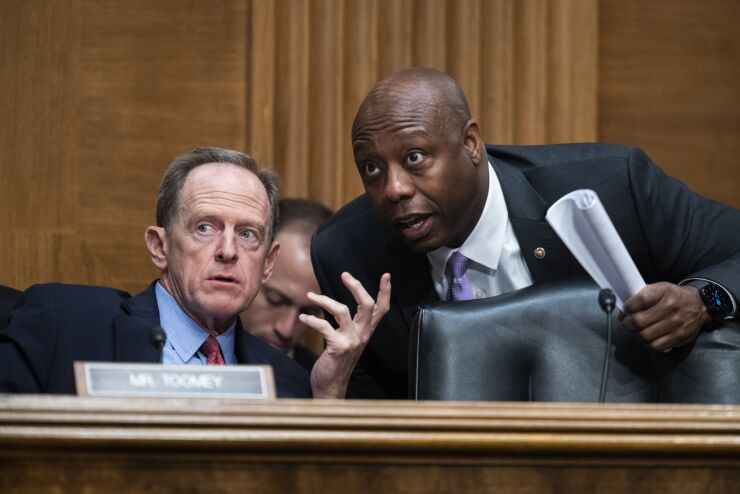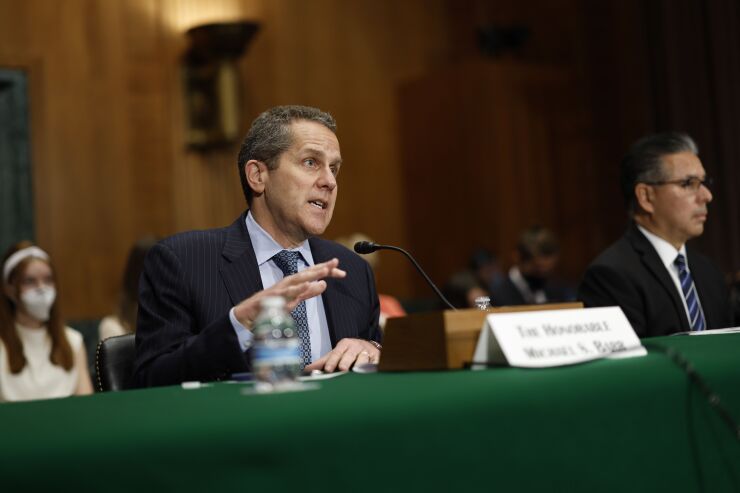Senate Banking Republicans have a new rallying cry against the Federal Reserve: the capital requirements are too damn high.
Several Republicans on the committee, including ranking member Sen. Pat Toomey, R-Pa., criticized the Fed's current capital requirements as overly restrictive during
"Some seem to think that [with] additional regulation and added capital requirements, there's no cost, so why not?" Toomey said while questioning the panel executives. "It seems to me that there is a cost of adding unnecessary capital requirements on an already well-capitalized institution."

Sens. Tim Scott, R-S.C. and Bill Hagerty, R-Tenn., echoed these sentiments during their allotted questioning periods.
Scott, who is next in line to replace Toomey as top Republican on the committee after Toomey retires at the end of the 117th Congress, said if banks are required to hold onto a greater share of their equity to absorb losses, it could lead to fewer loans being issued. This tightening of liquidity could have an outsized impact on small and minority-owned businesses, he added.
"Having been a small business owner, that formula looks like first time business owners [and] minority business owners are going to have a harder time getting the credit they need to grow and strengthen the economy in their neighborhoods," Scott said.
The issue was also raised on Wednesday during a
The calibration of bank capital requirements is the latest addition to a growing list of grievances some Senate Banking Republicans have with the Fed.
Toomey and Scott are part of a
"I'm concerned about the enormous power that some of the regulators have, especially the Fed, and power that is exercised in an opaque fashion," Toomey said Thursday.
Capital requirements have been under closer examination since Michael Barr was
Earlier this month, in
Barr made few firm commitments during the speech, noting that more formal action would be rolled out in the fall. Instead, he outlined a framework for the upcoming review.

"When calibrating requirements, we will work to minimize unintended consequences, limit opportunities for gaming, and avoid excess compliance costs that do not result in risk reduction," Barr said. "Taking a holistic view will help us consider adjustments, if any, to the supplementary leverage ratio, countercyclical capital buffer, and stress testing."
Barr's remarks were
"Fed Vice Chair Michael Barr all but indicated during a recent speech at the Brookings Institution that he intends to increase capital requirements for a large number of U.S. financial institutions, even as our economy has suffered two consecutive quarters of negative growth," Hagerty said during Thursday's hearing. "That's the technical definition of a recession."
This year's
But because some banks were forecasted to have slightly greater losses in the 2022 scenario than in the prior year's test, their mandated stress capital buffers for the coming year went up. Several heads of large banks
While discussing JPMorgan Chase's second quarter earnings on a call with investors, CEO Jamie Dimon called the Fed's stress testing policy a "terrible way to run a financial system."
Citigroup CEO Jane Fraser and Bank of America CEO Brian Moynihan also noted that changes to their banks' respective stress capital buffers would necessitate capital reallocations.
Dimon spoke out against the stress test in both congressional hearings. On Wednesday he said JPMorgan would one day be "sitting with a trillion dollars, unable to deploy to help our clients." Some bank regulatory experts have taken issue with this description, arguing it mischaracterizes bank capital as money being left idle instead of funding sourced from stakeholder equity and profits rather than deposits.
Still, bank capital is a more costly funding source for banks than deposits or other liabilities, meaning it still makes it harder for banks to issue new loans.
"In this instance, it would crowd out other financings that are needed in the market," Bill Demchak, CEO of PNC Financial Services, said during the hearing. "It's also making it more expensive and difficult for us to lend at a time when our country needs it. Cost of capital went up, funds are being used for something other than supporting our economy. Doesn't make sense to me."
Sen. Sherrod Brown, D-Ohio, chair of the Banking Committee, used his closing statement to highlight the role capital requirements have played in the regulatory regime that helped safeguard the banking system through the COVID-19 pandemic. He added that banks have benefited from many acts of Congress, some of which the industry opposed initially.
"Let's be clear, you're well capitalized and you thrived throughout the pandemic because of the capital requirements and safety and soundness measures .. we passed in Dodd-Frank, which you lobbied against, I would add," Brown said. "Your depositors had more money in their accounts because we put money in their pockets with the CARES Act, the American Rescue Plan and the Child Tax Credit. You reformed overdraft practices after years of pressure from this committee. Most of what you boasted about today came about either because of laws this committee in the Senate passed or because of pressure we placed on your industry — often despite some of your very expensive and very often effective lobbying efforts."





